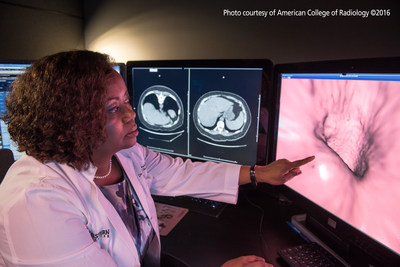Patient Advocates and Doctors Tell Congress to Pass Medicare Virtual Colonoscopy Coverage, Reports ACR
Patient Advocates and Doctors Tell Congress to Pass Medicare Virtual Colonoscopy Coverage, Reports ACR
WASHINGTON, April 2, 2019 /PRNewswire/ -- Colorectal cancer care advocates, minority health care organizations and medical associations want Congress to help address racial and ethnic disparities in screening and outcomes by passing the CT Colonography Screening for Colorectal Cancer Act (H.R. 1969). The bipartisan bill introduced in the U.S. House of Representatives today by Reps. Danny Davis (D-IL) and Brad Wenstrup (R-OH) would provide Medicare coverage for CT Colonography (CTC) screening — also known as virtual colonoscopy.

Latino Americans are more likely to die from colorectal cancer than those in many Central and South American countries. African Americans are far more likely to die from the disease than whites.
U.S. Census Bureau National Health Interview Survey (NHIS) data shows that while virtual colonoscopy use is comparatively modest, largely due to lack of Medicare coverage, its use is growing more quickly among Latinos and African-Americans. Those in both groups are more likely than whites to choose virtual colonoscopy. However, at present, both groups are less likely to be screened for colorectal cancer and their cancers are found at a later stage than in whites.
"Latinos are less likely to get tested for colorectal cancer due to the fear associated with colonoscopy screenings, among other factors. Latinos are also more likely to die from the disease. Virtual colonoscopy is a safe alternative, and will lead more Latino seniors to get screened," said Jose Ortiz, president and chief executive officer (CEO) of the Hispanic Health Council.
"Providing affordable options to patients is important. CT colonoscopy does not require sedation and is a screening option that many seniors need to consider. We can't let this lack of Medicare coverage, or other unexpected costs, remain and inhibit seniors' access to a lifesaving screening exam," said Anjee Davis, president of Fight Colorectal Cancer.
"Colorectal cancer is largely preventable thanks to effective screening tools. Ensuring access to proven screening exams through Medicare is especially important for America's vulnerable populations," noted Rep. Davis.
Previous studies in the U.S. and abroad have shown that use of this American Cancer Society-recommended exam raises screening rates and lowers costs. Virtual colonoscopy is also supported by the U.S. Preventive Services Task Force as a colorectal cancer screening test.
"Timely screening for colorectal cancer can literally save lives, but many patients cannot or will not have a colonoscopy. For them, CT colonography provides a less invasive option that they are more likely to choose. Medicare should cover this screening option," said Michael Sapienza, president and CEO of the Colorectal Cancer Alliance.
"Medicare-covered access to virtual colonoscopy can attract many who would otherwise not be tested, allowing doctors to remove polyps before they become cancers and prevent this deadly disease," said Carolyn R. ("Bo") Aldigé, CEO and founder of the Prevent Cancer Foundation.
Virtual colonoscopy is as accurate as standard colonoscopy in most people — including those 65 and older — and is far less invasive. Former President Obama had this test. Yet, Medicare refuses to cover seniors for these exams.
"Medicare coverage for virtual colonoscopy would ensure that the privately insured do not lose coverage for an exam they may want once they turn 65," said Anne Carlson, president of the Colon Cancer Coalition.
"Medicare coverage of virtual colonoscopy can increase screening, help doctors find more cancers early and avoid cancers by removing polyps before they turn cancerous. This will save lives — particularly among those where screening rates are historically lower and outcomes not as good," said Judy Yee, MD, chair of the American College of Radiology Colon Cancer Committee.
"As a doctor, I know how important cancer screenings are to detecting and treating disease as early as possible. That's why I am again leading efforts to increase access for Medicare beneficiaries to get simple, essential colorectal cancer screenings," said Rep. Wenstrup.
Nearly 40 states require insurance policies to cover virtual colonoscopy. Insurers who take part in federal exchanges are required by the Affordable Care Act (ACA) to cover the exam with no copay. UnitedHealthcare, CIGNA, Aetna, Anthem Blue Cross Blue Shield and others cover the test irrespective of ACA requirements.
Find more information on virtual colonoscopy (CT colonography) in English and Spanish at RadiologyInfo.org/virtualct.
![]() View original content to download multimedia:http://www.prnewswire.com/news-releases/new-bill-would-help-address-racial-and-ethnic-disparities-in-colorectal-cancer-care-300822999.html
View original content to download multimedia:http://www.prnewswire.com/news-releases/new-bill-would-help-address-racial-and-ethnic-disparities-in-colorectal-cancer-care-300822999.html
SOURCE American College of Radiology




